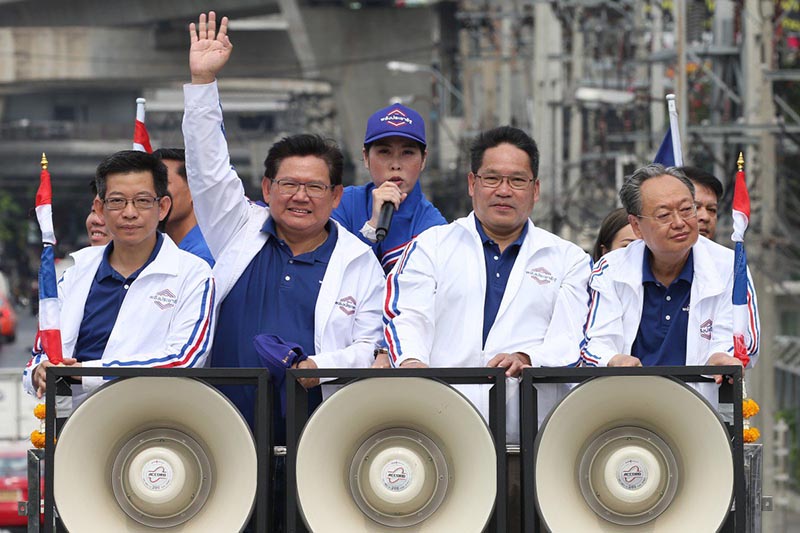Official Thai election results may herald pro-junta government

Pro-junta party Palang Pracharath thanks supporters after the election. Photo: EPA-EFE
BANGKOK, May 7, 2019, Bloomberg. The official results of Thailand’s March 24 election due this week are set to boost a push by a pro-military party to form a governing coalition, unless an imminent court ruling complicates the picture, reported the South China Morning Post.
The party, Palang Pracharath, is a proxy for the junta government and is duelling for power with an anti-junta alliance. Many small parties are expected to get parliament seats in the official count and are likely to back the pro-military group, said Punchada Sirivunnabood, an expert in Thai politics.
“They view the pro-military party as having the higher chance of forming a government and so will gravitate towards it,” said Punchada, a visiting fellow at Singapore’s ISEAS-Yusof Ishak Institute.
The election, held after almost five years of army rule, was both inconclusive and disputed. The latest complication is a court ruling due Wednesday on whether the Election Commission is allocating certain parliament seats in a valid way. An adverse judgment could jeopardise the May 9 deadline for certifying election results and delay the government’s formation.
The commission may release the winners of 350 constituency seats as early as Tuesday, and 150 party-list seats the day after. Unofficial results in March showed the Pheu Thai party linked to exiled former premier Thaksin Shinawatra won 137 constituency seats but fell short of a majority, followed by Palang Pracharath with 97.
A constituency seat is won by the candidate getting the most votes in that region. Party-list seats are allocated using proportional representation and are the topic of the court ruling amid confusion over whether the poll agency is using the right formula.
Days after the poll, Pheu Thai said it had formed a seven-member coalition that unofficially would have 255 seats in the 500-strong lower house.
But Election Commission comments that more parties will get seats than previously expected signalled the coalition may have overestimated its seat strength.
The statements also sparked controversy over how the agency – which faced fierce criticism for its handling of the election – is allocating seats.
The Pheu Thai-led alliance is seeking to prevent Palang Pracharath from forming the government. Palang Pracharath disputes Pheu Thai’s claim of a majority, and has said it’s on course to take power and return junta leader Prayuth Chan-ocha as prime minister.
Future Forward, a key member of the Pheu Thai-led group, said there’s a high chance the pro-military party will be able to form a coalition government if the commission pushes ahead with its preferred formula leading to 27 parties in the lower house.
“This will not only bring Thailand back to the junta’s hand again under a democratic jacket, but also create a very unstable government with a slim majority in the parliament,” spokeswoman Pannika Wanich said.
Prayuth is seen as the favourite to return as premier because a junta-appointed 250-member Senate votes on who becomes prime minister, along with the lower chamber. That gives the military’s allies the upper hand in installing their preferred candidate.
Thai politics has been dominated for more than a decade by a tussle for power pitting the royalist and military elite against Thaksin Shinawatra and his allies, who draw support from the rural poor.
Thaksin Shinawatra-linked parties won the most seats in every election since 2001, only to be unseated from government by the army or the courts, most recently in a coup in 2014 led by Prayuth. The military establishment has rejected accusations that the latest electoral contest is unfair and stacked in its favour.
The question now is whether these tensions – as well as the challenge of managing a coalition government – will stymie policymaking in an economy where growth is slowing and lags behind neighbours in Southeast Asia.
“The pro-military government that’s likely to emerge after the election will survive up to a point,” said Punchada. “But there’ll be a tough road ahead for them when they have to run the government while negotiating with several coalition members.”